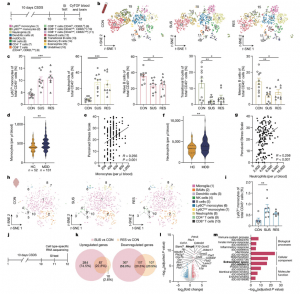Feeling stressed? It turns out, the effects go beyond just a racing heart and sweaty palms. New research reveals a fascinating connection between chronic stress, the immune system, and the brain, potentially playing a role in depression (Figure 1).

Figure 1: Stress increases monocyte numbers in the circulation and in the brain, and induces a pro-inflammatory transcriptional signature in monocytes of SUS mice. a, Experimental outline of CyTOF experiment. SI, social interaction. b,h, t-Distributed stochastic neighbour embedding (t-SNE) maps of CD45+ cells in blood (b) and brain (h). The colour of each cluster corresponds to the assigned cell type. BAMs, border-associated macrophages; moDCs, monocyte-derived dendritic cells; NK, natural killer. c, Frequencies of Ly6Chi monocytes (n = 10 CON, 12 SUS and 10 RES), neutrophils (n = 10 CON, 10 SUS and 9 RES), naive B cells (n = 10 CON, 10 SUS and 9 RES), transitional B cells and memory B cells (n = 10 CON, 10 SUS and 9 RES) in circulation. One-way ANOVA with Bonferroni post hoc test. Each data point represents one biological sample; data are mean ± s.e.m. d,f, Number of monocytes (d) and neutrophils (f) in the circulation of patients with MDD compared with healthy controls (HC). n = 52 heathy controls and 131 MDD; two-tailed Student’s t-test. e,g, Correlation between perceived stress and monocyte numbers (e; n = 169 (HC and MDD)) and neutrophil numbers (g; n = 169 (HC and MDD)). Two-tailed Pearson correlation coefficient. i, Ly6Chi monocytes in whole brain. n = 6 CON, 8 SUS and 7 RES. One-way ANOVA with Bonferroni post hoc test; each data point represents four pooled brains. Data are mean ± s.e.m. j, Experimental outline of cell type-specific RNA sequencing of Ly6Chi and Ly6Clow monocytes, B cells and T cells from blood. k, Number of differentially expressed genes (adjusted P value < 0.05 and log2 fold change > |1|) in Ly6Chi monocytes. l, The 25 most significantly differently expressed protein-coding genes in Ly6Chi monocytes from SUS versus CON mice. m, Top three gene ontology (GO) terms from significantly upregulated genes in Ly6Chi monocytes of SUS versus CON mice. k–m, P values adjusted for multiple comparisons. *P < 0.05, **P < 0.01, ***P < 0.001.
We already know chronic stress can mess with our mood. But scientists recently discovered a specific way it might do so: through an enzyme called MMP-8. Stressful situations cause our immune system to churn out more MMP-8, found in both mice and depressed humans.
But what’s this enzyme doing? Interestingly, MMP-8 doesn’t stay put. It travels from the blood, crosses into the brain, and settles in the “reward center” – the area responsible for motivation and pleasure. Once in the brain, MMP-8 disrupts communication, leading to behavioural changes in mice – they become withdrawn and avoid social interaction. While we can’t directly translate this to humans, it hints at a similar potential effect on mood.
The study also sheds light on another player: monocytes, immune cells that migrate to the brain during stress. They, too, contribute to MMP-8 production, further strengthening the connection between body and mind.
This research sheds light on the communication between immune system and brain, offering valuable insights into depression and other stress-related conditions. By understanding these pathways, scientists can develop more targeted treatments, potentially offering a new era of mental health care.
This is just one study, and more research is needed. But it’s an exciting step forward in understanding the mind-body connection and opens doors for future therapies to help us manage stress and its impact on our well-being.
Journal article: Cathomas, F., et al., 2024. Circulating myeloid-derived MMP8 in stress susceptibility and depression. Nature.
Summary by Stefan Botha










